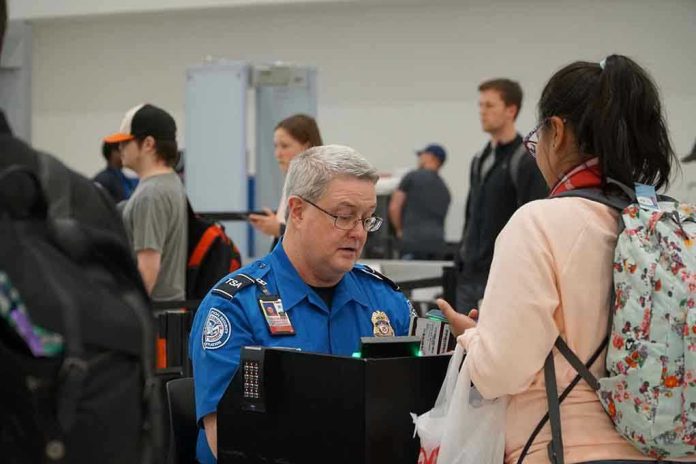
A three-day visa overstay by an Irish tourist has turned into a 100-day ordeal in federal detention, a 10-year ban from the United States, and a spotlight on the hardline immigration crackdown reshaping America under President Trump—a saga that would have been unthinkable just a year ago.
At a Glance
- An Irish tourist overstayed his 90-day visa waiver by three days due to a medical emergency.
- A minor police encounter triggered his arrest, resulting in months-long detention and deportation.
- He was banned from the U.S. for 10 years, despite having no criminal intent or prior record.
- West Virginia and Georgia now fast-track deportations by empowering local police as federal immigration agents.
Minor Overstay, Major Consequences: The New Face of Immigration Enforcement
Thomas, a 35-year-old tech worker from Ireland, arrived in the U.S. last fall under the Visa Waiver Program to visit his American girlfriend. Like millions of other law-abiding tourists, he expected to spend a few months enjoying the country and then head home. Instead, a medically documented injury delayed his departure by just three days—a technical violation, but one that would unleash the full force of the new zero-tolerance immigration regime.
A mental health episode and a domestic dispute led to Thomas’s arrest by local police. This single encounter, under policies recently enacted in West Virginia and Georgia, automatically triggered a call to Immigration and Customs Enforcement (ICE). What followed defies all sane logic and common sense: Thomas, who had no criminal record and posed no threat, was held for nearly 100 days in multiple detention centers—including a federal prison—before being deported and slapped with a decade-long ban from returning to the United States.
New Laws Empower Local Police, Strip Away Discretion
Under the Biden administration, such a minor overstay would have likely ended with a slap on the wrist, a warning, or a quick voluntary departure. But with Trump back in the White House and states like West Virginia racing to join the federal 287(g) program, the rules have changed. Local law enforcement officers are now deputized as ICE agents, with a mandate to detain and expedite the deportation of anyone suspected of an immigration violation—no matter how trivial or justified the cause.
Governor Patrick Morrisey of West Virginia has publicly embraced this agenda, declaring that the state “will not serve as a sanctuary for illegal immigrants” and that there will be “full cooperation” with ICE, even for technical or unintentional violations. Georgia has enacted similar laws, requiring police to notify ICE of any arrest involving a suspected undocumented immigrant, regardless of the circumstances. These measures, cheered by some as restoring order, have turned minor mistakes or emergencies into life-altering punishments for visitors who never intended to break the law.
Detention for Tourists: Chilling Effect and Wasted Resources
Cases like Thomas’s are no longer rare. Tourists from Australia, Germany, Canada, and the UK have all found themselves swept up in the dragnet, detained for weeks or months over minor visa issues. Legal experts and advocacy groups are sounding the alarm, blasting the “completely incomprehensible, punitive detention” of non-criminal visitors as a colossal waste of resources and an affront to due process. Even ICE has the authority to release detainees with removal orders, but under current policy, the default is detention—no matter the facts.
The impact of these policies goes far beyond individual hardship. Families are torn apart, skilled workers are lost, and America’s reputation as a welcoming, rational nation is taking a beating. The private prison industry, meanwhile, is cashing in on a surge of immigration detentions, filling beds with non-violent tourists and business travelers as the crackdown intensifies.
The Trump Effect: Swift, Sweeping, and Unforgiving
The Trump administration’s second term has brought a seismic shift in immigration enforcement. Border encounters have plummeted to record lows, the border wall is rising again, and the military has been deployed to bolster border security. While some celebrate the restoration of sovereignty, others see an America that has lost its sense of proportion—where a three-day overstay leads to 100 days in prison, and where no amount of common sense can override the machinery of government.
As Thomas boards a flight back to Ireland, banned for a decade from ever returning, Americans are left to wonder: is this really the kind of country we want? A place where decency, discretion, and family ties are sacrificed on the altar of bureaucratic zeal? If this is what “border security” looks like, maybe it’s time to ask some hard questions about who we’re really protecting—and at what cost.
Sources:
Governor Patrick Morrisey Announces Actions to Speed Illegal Immigrant Deportations
West Virginia Legislature – Bill Text HB2386
West Virginia Code Chapter 15, Article 16
LegiScan – West Virginia HB2008



